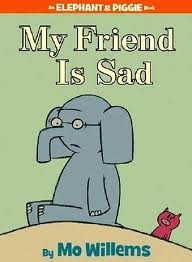Issues of friendship are addressed: My Friend Is Sad, Should I Share My Ice Cream? Can I Play Too? I Will Surprise My Friend! And my favourite, We Are In A Book!
My Friend Is Sad begins with Gerald, the ellie, who has a very sad face.
Piggie tries all sorts of things to cheer him up: dressing up as a cowboy, a clown and a robot. But Gerald remains sad
Eventually we discover that Gerald is sad because Piggie isn’t there, and because he can’t share the cool cowboy, clown and robot with Piggie – whom he is unable to recognise beyond the disguise. Happily, it all works out in the end, with a clever twist (that I subsequently spotted in all of the Elephant and Piggie books).
Piggie tries all sorts of things to cheer him up: dressing up as a cowboy, a clown and a robot. But Gerald remains sad
Eventually we discover that Gerald is sad because Piggie isn’t there, and because he can’t share the cool cowboy, clown and robot with Piggie – whom he is unable to recognise beyond the disguise. Happily, it all works out in the end, with a clever twist (that I subsequently spotted in all of the Elephant and Piggie books).
Mo Willems’s books are not only gorgeous to look at and easy to read,
with very clean, well-designed pages and simple text – they’re also widely
recognised: Two books in the series have been listed on Time
magazine's ‘Top 10 Children's Books of the Year’: Today I Will Fly in 2007 and
Elephants Cannot Dance! in 2009.
In terms of target reader, I’d say parents could read these books to
toddlers from age 1, but – as the pages are paper rather than board – solo
reading would probably be best from ages 2 to 4. And the range of books would
be good to keep, to come back to in primary school, when it comes to navigating
friendships and conflicts.
(This review will soon appear on the JoziKids blog.)







